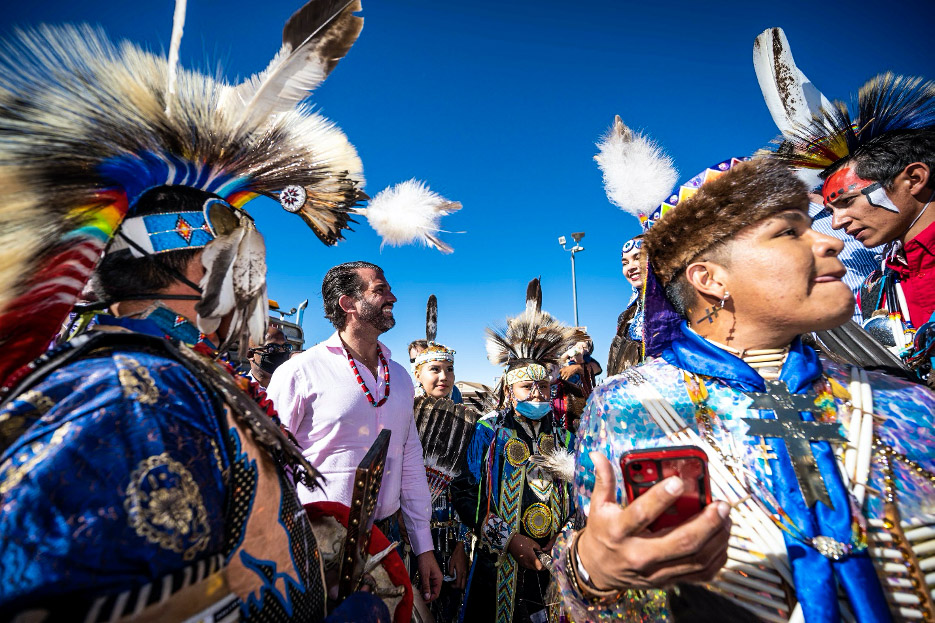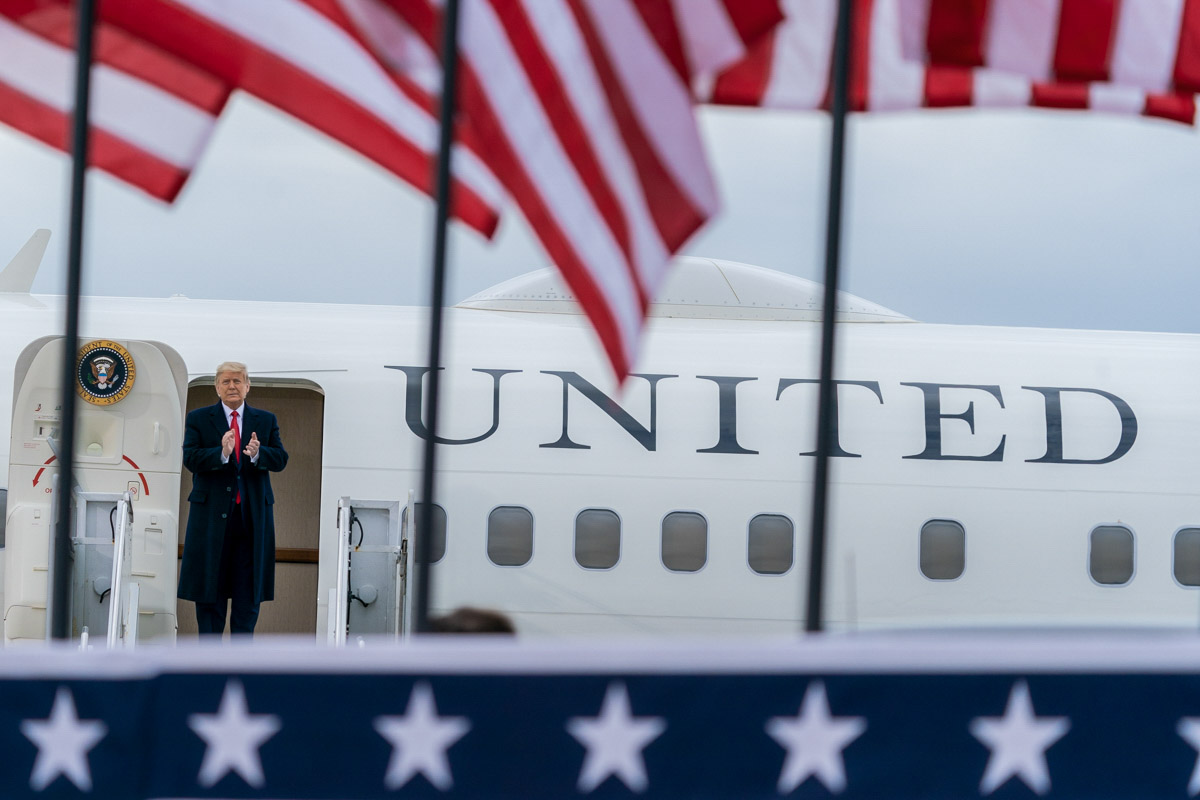Indianz.Com > News > Forgotten no more?: Trump team puts Native people last on ‘important’ call
‘Forgotten no more!’: Trump team puts Native people last on important call
Wednesday, October 21, 2020
Indianz.Com
Just days after their boss bashed Indigenous Peoples Day and got his supporters to boo the idea, members of the Donald Trump administration tried their best to portray the president as someone who cares about the interests of America’s “first” inhabitants.
During a conference call on Tuesday afternoon, several Trump political appointees announced the Putting America’s First Peoples plan. The three-page document marks the first time since the president took office almost four years ago that he has laid out any sort of Indian Country policy.
“President Trump is committed to honoring the heritage of America’s first inhabitants and partnering with Native Americans to build a brighter future,” reads the short plan, whose subtitle is an emphatic “Forgotten No More!”
Coming just two weeks before the November 3 election, the release of the plan bears all the marks of a campaign announcement. The document includes a list of promises, including one to host a national gathering of tribal leaders, a practice that Trump stopped after he became president in January 2017. Up until now, in fact, the president has failed hold such an event despite repeated requests from Indian Country. But in the era of Trump, nothing is as it seems. The 5pm Eastern conference call was pitched by the White House as as an “important” Indian Country announcement in an invitation email sent to tribal leaders earlier in the day. As a result, few in Indian Country had any idea what they signed up for. “It probably will be just another waste of all of our time,” said one tribal official, who was lured into a similar 5pm call by the White House on the Friday before Memorial Day, only to find out little of substance was delivered. And with no one from the president’s re-election campaign involved, the call had an inadvertent yet telling effect. The announcement ended up putting the “first peoples” dead last.Just two weeks before the election, Donald Trump released his "Putting America's People First Plan" outlining his Indian Country policy for the first time since taking office more than three years ago. #NativeVote #NativeVote20 #NativeVote2020https://t.co/r1VetMVSR0
— indianz.com (@indianz) October 20, 2020


Related Stories
Montana Free Press: Leader of public lands agency served unlawfully for over a year (October 21, 2020)Donald Trump releases ‘First Peoples’ plan (October 20, 2020)
Cronkite News: Court rules against Navajo voters in ballot lawsuit (October 19, 2020)
President Trump disavows Indigenous Peoples Day (October 19, 2020)
Hundreds of tribal and Indian Country leaders endorse Joe Biden for president (October 15, 2020)
Joe Biden #IndigenousPeoplesDay (October 12, 2020)
Democratic National Committee recognizes Indigenous People’s Day (October 12, 2020)
Joe Biden celebrates Indigenous People’s Day (October 12, 2020)
Biden-Harris campaign celebrates Indigenous Peoples Day (October 12, 2020)
Rep. Haaland ‘honored’ to be considered for Biden Cabinet (October 12, 2020)
Navajo Nation President Jonathan Nez meets with Joe Biden and Kamala Harris (October 9, 2020)
‘We need a uniter’: Tribal leaders endorse Democrat Joe Biden for president (October 8, 2020)
What Indian Country is saying about the Biden-Harris Plan for Tribal Nations (October 8, 2020)
Joe Biden and Kamala Harris release Plan for Tribal Nations (October 8, 2020)
Harold Frazier: Joe Biden for president of the United States (October 5, 2020)
Mashpee Wampanoag Tribe endorses Democrat Joe Biden for president (October 2, 2020)
Native American Democrats host monthly meeting (September 30, 2020)
Biden for President hosts Native small business event (September 22, 2020)
Native Americans for Biden host Two Spirit roundtable (September 16, 2020)
Native American Veterans for Biden Roundtable Discussion (September 10, 2020)
Search
Filed Under
Tags
More Headlines
Cronkite News: Community pays tribute to Congressman Raúl Grijalva
Press Release: Sen. Gallego (D-Arizona) protests firings at Department of Veterans Affairs
Native America Calling: The righteous rebellion of Indigenous punk rock
NAFOA: 5 Things You Need to Know this Week (March 31, 2025)
Chuck Hoskin: Cherokee Nation celebrates Cherokee women
Native America Calling: Tribal rights, a new restaurant and more are on The Menu
Native America Calling: Tribes vie for better access to traditional plants
Senate committee schedules confirmation hearing for Interior nominee
Fact Sheet: Department of Health and Human Services to undergo ‘dramatic restructuring’
Press Release: Department of Health and Human Services to undergo ‘dramatic restructuring’
Native America Calling: The new Social Security reality for Native elders
Montana Free Press: Hip-hop artist Foreshadow celebrates latest release
Cronkite News: Bill creates alert system for missing and murdered relatives
Bureau of Indian Affairs approves HEARTH Act regulations for Mohegan Tribe
House Subcommittee on Indian and Insular Affairs sets field hearing for self-determination anniversary
More Headlines
Press Release: Sen. Gallego (D-Arizona) protests firings at Department of Veterans Affairs
Native America Calling: The righteous rebellion of Indigenous punk rock
NAFOA: 5 Things You Need to Know this Week (March 31, 2025)
Chuck Hoskin: Cherokee Nation celebrates Cherokee women
Native America Calling: Tribal rights, a new restaurant and more are on The Menu
Native America Calling: Tribes vie for better access to traditional plants
Senate committee schedules confirmation hearing for Interior nominee
Fact Sheet: Department of Health and Human Services to undergo ‘dramatic restructuring’
Press Release: Department of Health and Human Services to undergo ‘dramatic restructuring’
Native America Calling: The new Social Security reality for Native elders
Montana Free Press: Hip-hop artist Foreshadow celebrates latest release
Cronkite News: Bill creates alert system for missing and murdered relatives
Bureau of Indian Affairs approves HEARTH Act regulations for Mohegan Tribe
House Subcommittee on Indian and Insular Affairs sets field hearing for self-determination anniversary
More Headlines